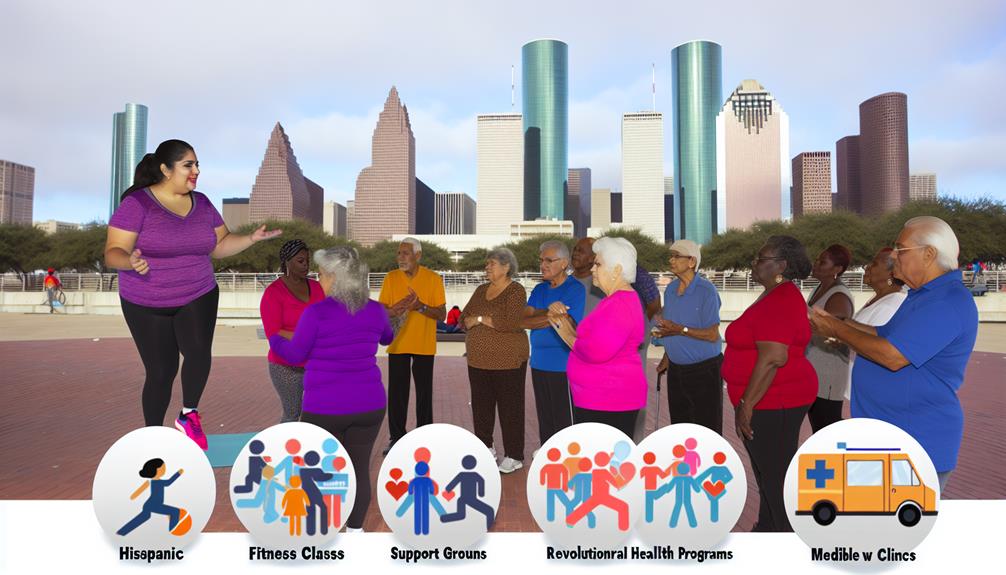As we delve into the changing healthcare landscape in Houston for the aging population, it's clear that we need refined strategies to meet their unique needs.
To truly make a difference, we must explore innovative approaches that consider all aspects of healthcare delivery for seniors.
These strategies seek to transform how we support the elderly and create a healthcare system that is both sustainable and effective.
By focusing on these key strategies, we pave the way for improved elderly care in Houston, giving us a glimpse of what the future holds for healthcare for older adults.
Medicaid Waivers for Senior Care
When it comes to catering to the needs of Houston's growing elderly population, thinking outside the box with new Medicaid waivers is key. As more seniors require long-term care, these waivers offer the flexibility needed to meet their evolving needs effectively. In Texas, including Houston, innovative waivers like the 1115 Medicaid Transformation waiver have been instrumental in reshaping how care is provided to the elderly, especially in long-term care.
The recent cancellation of the 1115 waiver by the Biden administration has stirred worries about the future of Medicaid services for seniors in Texas. This has led to a call for public feedback to navigate the repercussions of this decision on senior care, including specialized services like dementia care. Considering the costs involved in long-term care, the importance of creative Medicaid waiver programs in addressing the healthcare needs of Houston's aging population can't be overstated.
State-Funded Long-Term Care Insurance
Meeting the growing need for senior care in Texas is a pressing issue that requires our attention. State-funded long-term care insurance plays a crucial role in supporting the elderly population. Alongside programs like Medicaid waivers, it ensures that low-income seniors and individuals with disabilities receive the care they need. These initiatives make long-term care services, including specialized dementia care, more accessible to those who require assistance.
The recent cancellation of the 1115 Medicaid Transformation waiver highlights the importance of public participation in shaping care for vulnerable seniors. By introducing innovative solutions like state-funded long-term care insurance, Texas can better address the financial and care challenges posed by its increasing senior population. Recognizing the significance of these resources is vital to guarantee that aging individuals receive the essential support and services to uphold their quality of life. State-funded long-term care insurance serves as a vital support system for many seniors, offering them the help they need to age with dignity and security.
Collaboration With Local Entities

Working hand in hand with local establishments like hospitals, clinics, and community organizations can make a world of difference in improving healthcare access for Houston's elderly population. When we team up with healthcare providers in our area, we can create customized programs and services that cater to the specific needs of older adults in Houston. It's crucial to collaborate with local governments and non-profits to establish a strong support system for seniors in our community. This collaboration enhances care coordination, resulting in better health outcomes for aging individuals in Houston. By closely partnering with local entities, we can brainstorm and implement innovative solutions to meet the rising demand for healthcare services among Houston's older population.
| Advantages of Partnering with Local Organizations | |
|---|---|
| Tailored healthcare initiatives for seniors | Enhanced care coordination leading to improved outcomes |
| Robust support network for elderly individuals | Innovative approaches to address growing healthcare needs |
Financial Options for Healthy Aging
When it comes to planning for your financial well-being as you age, it's crucial to look into options like Medicare coverage, retirement savings plans, and health insurance.
Understanding how these choices work can have a big impact on your ability to access good healthcare as you get older.
By taking proactive steps to prepare for your financial future, you can ensure you'll have the means to take care of yourself in the long term.
It's all about setting yourself up for a healthy and secure retirement.
Medicare Coverage Options
As Houston's older population navigates their healthcare needs, understanding the ins and outs of Medicare coverage is crucial. Medicare steps in to cover hospital stays, doctor visits, preventive care, and some prescription drugs.
For those unexpected costs that Medicare doesn't cover, Medigap plans offer a safety net. Alternatively, Medicare Advantage plans present another route to receiving benefits through private insurance companies.
Retirement Savings Plans
When it comes to securing your finances as you get older, it's crucial to take an active role in planning for retirement. As Houston's population ages rapidly, it's smart to consider options like 401(k) plans, IRAs, and annuities. These plans not only help you save for retirement but also cover healthcare expenses, especially with the cutting-edge medical treatments available at the Texas Medical Center.
One tip is to delay receiving Social Security benefits to increase your monthly payments, giving you more funds for healthcare needs. It's also wise to think about long-term care insurance to cover costs that regular health insurance may not include.
Working with financial advisors to create a personalized retirement strategy tailored to your specific needs can ensure a stable financial future as you grow older. By taking these steps, you can better prepare for the financial aspects of aging and enjoy peace of mind in your retirement years.
Health Insurance Choices
When it comes to navigating health insurance options for healthy aging, especially for the seniors in Houston, it's crucial to understand the different choices available. Here are some key points to consider when thinking about financial options for aging well:
- Medicare: This covers individuals who are 65 years old and above.
- Medicaid: Designed to help low-income individuals access healthcare services.
- Private Insurance: Offers extra benefits and tailored coverage for specific healthcare needs.
- Making Informed Choices: Assisting older adults in getting the care they need to maintain their health.
- Healthcare Access: The type of health insurance you choose can impact how easily you can access necessary healthcare services.
It's important to be well-informed and make the right decisions to ensure a healthy and supported aging process.
Geriatric Social Worker Availability
As Houston's population ages, the role of geriatric social workers becomes increasingly vital. These professionals specialize in addressing the unique social and emotional needs of older adults, working closely with healthcare providers to improve access to mental health services.
Training Geriatric Social Workers
Training geriatric social workers is crucial to meeting the healthcare needs of Houston's growing elderly population. As the number of seniors in Houston continues to increase, having specialized professionals who understand the unique challenges faced by this group is vital. Here are some key points to consider:
- Geriatric social workers offer personalized support to older adults in healthcare settings.
- The rising elderly population in Houston demands a sufficient number of well-trained geriatric social workers to ensure top-notch care.
- Increasing the availability of geriatric social workers can improve access to specialized services.
- Trained professionals play a significant role in addressing the healthcare needs of the elderly effectively.
- Recruiting and training more geriatric social workers is essential for enhancing the overall quality of care for seniors in Houston.
Collaborating With Healthcare Providers
When it comes to supporting the social and emotional needs of Houston's older population, teaming up with healthcare providers, especially geriatric social workers, is key. These professionals specialize in tailoring assistance and connections to address the unique hurdles faced by seniors in healthcare settings.
By partnering with geriatric social workers, we can significantly enhance the overall well-being and quality of life for aging individuals in Houston. They play a crucial role in coordinating care, advocating for patients, and linking them to community services that fit their needs best.
Access to geriatric social workers not only improves healthcare outcomes but also ensures that older adults in Houston receive comprehensive care that addresses their physical, emotional, and social health. This firsthand experience underscores the importance of collaboration with geriatric social workers to better support our aging population.
Increasing Resources for Seniors
Working alongside healthcare providers, especially geriatric social workers, can make a huge difference in the care and support available to Houston's aging population. Let's dive into some key points to consider:
- Geriatric social workers are essential in meeting the diverse needs of the elderly.
- Having these specialized social workers around can lead to better outcomes for seniors.
- They're skilled at navigating the specific challenges older adults face in healthcare settings.
- Access to geriatric social workers ensures comprehensive care and improved service coordination.
- Increasing the presence of geriatric social workers can greatly enhance the well-being of Houston's aging community.
Reevaluating Medicaid Community Care
Rethinking how Medicaid community care services can better cater to the changing healthcare needs of Houston's aging population is crucial for providing top-notch long-term support and services. In Texas, these services are managed through waivers like the 1115 Medicaid Transformation waiver, which allows for flexibility in reshaping care delivery for seniors in need of long-term services and support. However, with the recent withdrawal of the 1115 waiver by the Biden administration, there's a clear call for public input and discussion to ensure effective senior care.
Dealing with the expenses of long-term care, particularly specialized dementia care, is key to maintaining sustainable Medicaid community care. Currently, public feedback is being gathered to address the impact of the waiver withdrawal on senior care in Texas. By actively participating in this reassessment process, stakeholders can collaborate towards creating a more streamlined and responsive Medicaid community care system that caters to the distinct healthcare needs of Houston's aging population.
Development of New Programs

Hey there!
If you're looking to cater to the healthcare needs of Houston's growing older population, you might want to think about rolling out some fresh programs that focus on innovation and expanding services. These programs should be designed to offer specialized care for seniors with complex medical needs, making sure they get the attention and care they need.
Program Innovation
Creating innovative healthcare programs tailored to meet the needs of Houston's aging population is crucial for improving access and quality of care. These programs have the power to transform healthcare for older adults in the area by addressing gaps in current services, improving healthcare delivery with specialized programs, emphasizing preventive care and managing chronic diseases, providing crucial mental health support, and offering social services designed specifically for the needs of older adults.
Service Expansion
When it comes to senior care in Houston, creating new programs to meet the healthcare needs of the aging population is crucial. By focusing on tailored services for age-related conditions and promoting overall wellness among seniors, we can significantly improve their quality of life.
Programs like geriatric care, memory care, and palliative care cater to seniors' unique needs, while expanding home healthcare, adult day care, and caregiver support ensures a well-rounded approach to senior well-being.
Introducing innovative initiatives in telemedicine, preventive care, and chronic disease management can further enhance healthcare access and outcomes for seniors in Houston. These efforts make a positive impact on the overall well-being of the aging population by addressing their specific healthcare requirements effectively.
Partnerships for Senior Support
Creating strong partnerships with community organizations is key to enhancing support services for seniors in Houston. When you team up with different groups, you can build a wide network of care to meet the diverse needs of the aging population. Here are some great reasons why partnerships are crucial for senior support:
- Enhanced Access: Working together can improve seniors' access to healthcare, social services, and resources.
- Community Involvement: Engaging with local senior centers, nonprofits, and government agencies offers a wide range of support services.
- Comprehensive Care: Collaborative partnerships can address seniors' medical care, transportation, and social activities comprehensively.
- Efficient Resource Use: By combining resources and expertise, organizations can have a bigger impact on seniors' well-being.
- Customized Solutions: Partnerships enable tailored solutions to meet Houston's aging population's specific and changing healthcare needs.
Innovative Senior Care Solutions

When it comes to senior care in Houston, we need innovative solutions that blend modern healthcare practices with specialized services tailored to the needs of the elderly. By applying managed care principles like Medicaid waivers and state-funded long-term care insurance, we can provide cost-effective options for senior care.
Expanding access to geriatric social workers is crucial to offer personalized support to seniors, ensuring they get the attention and help they require. Collaboration among local governments, private businesses, and nonprofits is key to creating financial pathways for healthy aging and building a comprehensive support system for seniors.
Lawmakers have a chance to improve home and community-based care to better suit seniors' needs, enabling them to age comfortably in familiar settings. The recent cancellation of the 1115 Medicaid Transformation waiver highlights the importance of public involvement in shaping care for vulnerable seniors, emphasizing the need for community engagement in decision-making processes.
Promoting Productive Aging
As we look to uplift Houston's older population, it's essential to focus on their well-being and involvement in the community. Encouraging active participation among seniors is key to their continued contribution to society, benefiting both their physical and mental health.
- Encouraging Engagement: Inspire older adults to participate in work, volunteering, and other activities to stay connected and active.
- Improving Health: Programs that support active aging can lead to better health outcomes for seniors.
- Community Backing: Houston can thrive by implementing initiatives that keep older adults engaged within the community.
- Fighting Isolation: Active aging efforts can reduce loneliness, boost social connections, and enhance overall well-being.
- Creating an Age-Friendly Environment: By promoting active aging strategies, we can build a more inclusive and age-friendly atmosphere in Houston.
Frequently Asked Questions
What Are Some Strategies the US Healthcare System Can Employ to Prepare for the Growing Aging Population?
Planning for the increasing number of older adults in our communities? Here are some practical steps to consider: incorporating geriatric training, exploring new home healthcare approaches, boosting research funding, enhancing collaboration among healthcare providers, and expanding access to long-term care services. These strategies can truly make a difference in addressing the needs of our aging population.
As someone who has navigated this field, I can attest to the value of these initiatives firsthand. By implementing these measures, we can better support our older adults and ensure they receive the care and attention they deserve. It's not just about preparing for the future; it's about making a real impact in the lives of those who have paved the way for us. Let's work together to create a more age-friendly society.
What Are the Strategies for Ageing Population?
When it comes to catering to the needs of our aging population, it's crucial to focus on providing specialized training for healthcare providers, coming up with innovative care solutions, conducting thorough research on medical and cognitive changes, encouraging collaboration among providers, and establishing comprehensive care systems with strong community support. This approach ensures that our seniors receive the best possible care tailored to their unique requirements, promoting their well-being and quality of life. As someone who has worked closely with seniors, I've seen firsthand the positive impact these strategies can have on their lives, making a real difference in their health and happiness. It's not just about addressing aging needs; it's about creating a supportive and nurturing environment for our seniors to thrive and enjoy their golden years to the fullest.
What Is the Best Solution to the Problems of Having an Aging Population?
Dealing with the challenges posed by an aging population calls for thinking outside the box. One effective approach is exploring innovative managed care solutions. Additionally, increasing access to specialized assistance, such as geriatric social workers, can make a significant difference. It's also crucial to collaborate with different sectors to explore financial options that can support seniors in need. Advocating for cost-effective care is essential, and seeking input from the public can lead to impactful decisions that truly make a difference in the lives of the elderly.
What Is the Best Way to Cope With Population Aging?
Dealing with the challenges of an aging population requires a thoughtful approach that focuses on healthcare advancements, specialized training for healthcare providers, initiatives to enhance quality of life, and improved communication strategies. By investing in research and promoting collaboration, we can effectively meet the unique needs of our aging community. As someone who has navigated these issues firsthand, I can attest to the importance of proactive measures in addressing the changing landscape of our population.
